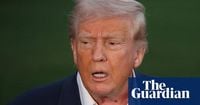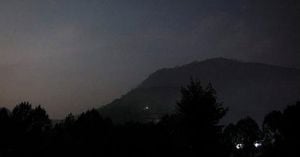In a controversial move that has sent shockwaves through Hollywood, President Donald Trump announced plans to impose a 100% tariff on movies produced outside the United States, including those filmed in South Africa. This declaration, made via a post on Truth Social on May 4, 2025, has raised concerns among filmmakers and industry leaders about the potential implications for the global film market.
Trump asserted that other countries are luring American filmmakers away with various incentives, leading to what he described as a "National Security threat." He stated, "The movie industry in America is dying a very fast death. Other countries are offering all sorts of incentives to draw our filmmakers and studios away from the United States. Hollywood, and many other areas within the USA, are being devastated." He further directed the Department of Commerce and the United States Trade Representative to initiate the tariff process, emphasizing that he wanted to see "movies made in America, AGAIN!"
This announcement comes at a time when the U.S. film industry is facing increased competition from international markets. According to The Numbers, 1,151 movies were produced in the United States in 2024, accounting for 69.9% of all titles created that year, generating a total box office revenue of $18 billion. However, if implemented, the tariffs could severely impact South Africa’s burgeoning film industry, which has become a popular location for international productions.
Veteran broadcasting journalist Thinus Ferreira pointed out that numerous foreign films, including Prime Video’s G20 featuring Viola Davis and Canal+’s Huntington with Glen Powell, Ed Harris, and Margaret Qualley, have recently been filmed in South Africa. Additionally, parts of Prime Video’s hit show The Wheel of Time were shot on location in the country. The local film industry has seen significant success, particularly with the Netflix live-action adaptation of One Piece, which became the most-watched show worldwide for two consecutive weeks after its launch in August 2023.
Despite its initial success, the One Piece series, filmed at Cape Town Film Studios, has faced a decline in viewership, with Netflix reporting 72 million views between July 1 and December 31, 2023. The show is based on Japan’s top-selling graphic novel series, which has sold over 500 million copies worldwide since its debut in 1997.
Whoopi Goldberg, a prominent figure in the entertainment industry, voiced her disapproval of Trump’s proposed tariffs during an episode of The View. She remarked, "Okay, look, you can’t do that. What that equates to is, you’re going to tell me how to write the story I want to write if it happens in Europe?" Goldberg emphasized the importance of collaboration with international talent and criticized the notion of imposing tariffs on films. She suggested that instead of restricting overseas filming, the focus should be on providing better incentives within the U.S. to keep productions domestic.
In response to the backlash, the White House clarified that "no final decisions" had been made regarding the tariffs. A spokesperson stated, "The Administration is exploring all options to deliver on President Trump’s directive to safeguard our country’s national and economic security while Making Hollywood Great Again." Meanwhile, actor Jon Voight and producer Steven Paul have presented a comprehensive plan to Trump aimed at revitalizing the entertainment industry, which includes federal incentives for production, co-production treaties, and infrastructure subsidies.
Trump’s tariff announcement has had a notable impact on the stock market as well. Following the news, Netflix shares fell by 4% to $1,113, resulting in a loss of approximately $20.4 billion in market capitalization. Other companies in the entertainment sector, such as Disney, Warner Bros. Discovery, and Paramount Global, also experienced declines in their stock prices.
Industry analysts have raised questions about how such tariffs would be implemented, given the complexities involved in categorizing films and services. Henning Molfenter, a former head of the German Babelsberg Studio, noted the uncertainty surrounding the application of tariffs to films, streaming series, and international co-productions.
As the situation unfolds, Trump has softened his stance, stating he is not looking to harm the industry but rather to support it. He expressed intentions to meet with film industry leaders to discuss the proposed tariffs, emphasizing the need for jobs in the sector. California Governor Gavin Newsom has responded to the announcement by proposing a $7.5 billion federal tax incentive scheme to bolster domestic production and maintain California’s leadership in the entertainment industry.
Newsom’s proposal comes on the heels of his earlier announcement to increase California’s film and television tax credit to $750 million. Meanwhile, California Senator Adam Schiff has condemned the tariff proposal, advocating for a federal tax credit scheme that would encourage domestic production without imposing blanket tariffs.
Late-night television hosts have not shied away from commenting on the situation, with Jimmy Kimmel and Jimmy Fallon expressing their disbelief at Trump’s assertions regarding foreign films as a national security threat. Kimmel quipped, "I don’t care where they’re made. I really don’t," while Fallon humorously speculated about the potential for future films to be set in less glamorous locations.
The unfolding saga surrounding Trump’s proposed tariffs on foreign films highlights the ongoing tension between protecting domestic industries and embracing the global nature of filmmaking. As the industry grapples with these developments, the future of Hollywood and its international collaborations hangs in the balance.




